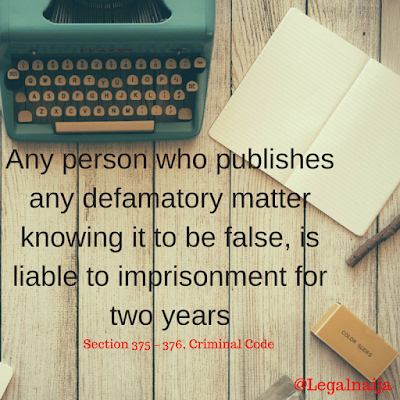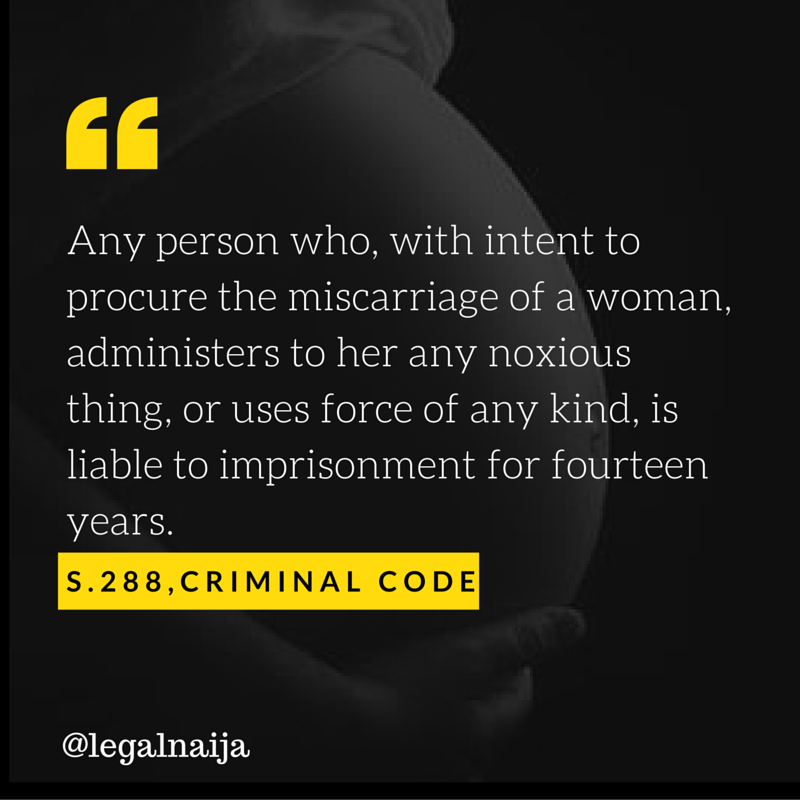
Freedom of Expression and the Blogger under Nigerian Law – Timothy Tion

The recent arrest of Abubakar Sidiqu; a blogger, by operatives
of the Economic and financial Crimes Commission (EFCC) supposedly because of a
post which is critical of the EFCC Chairman has brought to the fore once again
the issue of freedom of expression and defamation especially on the Internet.
of the Economic and financial Crimes Commission (EFCC) supposedly because of a
post which is critical of the EFCC Chairman has brought to the fore once again
the issue of freedom of expression and defamation especially on the Internet.
The 1999 Constitution of
the Federal Republic of Nigeria (as amended) under section 39(1) provides for
freedom of expression. But under section 39(3) the right to freedom of
expression could be restricted by a law reasonably justifiable in a democratic
society, for the purpose of preventing the disclosure of information received
in confidence or for the purpose of maintaining the authority and independence
of the courts and also section 45(1) which provides that nothing in section 39
shall invalidate any law that is reasonably justifiable in a democratic
society, in the interest of defence, public safety, public order, public
morality or public health; or for the purpose of protecting the rights and
freedom of other persons.
the Federal Republic of Nigeria (as amended) under section 39(1) provides for
freedom of expression. But under section 39(3) the right to freedom of
expression could be restricted by a law reasonably justifiable in a democratic
society, for the purpose of preventing the disclosure of information received
in confidence or for the purpose of maintaining the authority and independence
of the courts and also section 45(1) which provides that nothing in section 39
shall invalidate any law that is reasonably justifiable in a democratic
society, in the interest of defence, public safety, public order, public
morality or public health; or for the purpose of protecting the rights and
freedom of other persons.
Therefore the test to
determine whether a law which limits freedom of expression is constitutional or
otherwise is whether the law is:
determine whether a law which limits freedom of expression is constitutional or
otherwise is whether the law is:
(a) reasonably
justifiable in a democratic society;
justifiable in a democratic society;
(b) for the purpose
of preventing the disclosure of information received in confidence;
of preventing the disclosure of information received in confidence;
(c) for the purpose
of maintaining the authority and independence of the courts;
of maintaining the authority and independence of the courts;
(d) in the interest
of defence;
of defence;
(e) in the interest
public safety;
public safety;
(f) in the interest
public order;
public order;
(g) in the interest
public morality;
public morality;
(h) in the interest public health; or
(i) for the purpose of protecting the
rights and freedom of other persons.
rights and freedom of other persons.
The question that follows
therefrom is whether the following laws which tend to limit freedom of
expression meet or do not meet the constitutional criteria for a law limiting
the freedom of expression as provided in section 39(3) and 45(1) above
mentioned. The laws are as follows:
therefrom is whether the following laws which tend to limit freedom of
expression meet or do not meet the constitutional criteria for a law limiting
the freedom of expression as provided in section 39(3) and 45(1) above
mentioned. The laws are as follows:
Section 24 of Cybercrime (Prohibition, Prevention, Etc.) Act, 2015 which
provides that:
provides that:
“Any person who
knowingly or intentionally sends a message or other matter by means of computer
systems or network that –
knowingly or intentionally sends a message or other matter by means of computer
systems or network that –
(a) is grossly
offensive, pornographic or of an indecent, obscene or menacing character or
causes any such message or matter to be so sent; or
offensive, pornographic or of an indecent, obscene or menacing character or
causes any such message or matter to be so sent; or
(b) he knows to be
false, for the purpose of causing annoyance, inconvenience danger, obstruction,
insult, injury, criminal intimidation, enmity, hatred, ill will or needless
anxiety to another or causes such a message to be sent: commits an offence
under this Act…
false, for the purpose of causing annoyance, inconvenience danger, obstruction,
insult, injury, criminal intimidation, enmity, hatred, ill will or needless
anxiety to another or causes such a message to be sent: commits an offence
under this Act…
(2)Any person who
knowingly or intentionally transmits or causes the transmission of any
communication through a computer system or network –
knowingly or intentionally transmits or causes the transmission of any
communication through a computer system or network –
(a)to bully,
threaten or harass another person, where such communication places another
person in fear of death, violence or bodily harm or to another person;
threaten or harass another person, where such communication places another
person in fear of death, violence or bodily harm or to another person;
(b)containing
any threat to kidnap any person or any threat to harm the person of another,
any demand or request for a ransom for the release of any kidnapped person, to
extort from any person, firm, association or corporation, any money or other
thing of value; or
any threat to kidnap any person or any threat to harm the person of another,
any demand or request for a ransom for the release of any kidnapped person, to
extort from any person, firm, association or corporation, any money or other
thing of value; or
(c)containing any
threat to harm the property or reputation of the addressee or of another or the
reputation of a deceased person or any threat to accuse the addressee or any
other person of a crime, to extort from any person, firm, association, or
corporation, any money or other thing of value: commits an offence under this
Act…”
threat to harm the property or reputation of the addressee or of another or the
reputation of a deceased person or any threat to accuse the addressee or any
other person of a crime, to extort from any person, firm, association, or
corporation, any money or other thing of value: commits an offence under this
Act…”
Section 391(1) of the
Penal Code for Northern Nigeria which provides as follows:
Penal Code for Northern Nigeria which provides as follows:
“whoever by words
spoken or reproduced by mechanical means or intended to be read or by signs or by
visible representations makes or publishes any imputation concerning a person,
intending to harm or knowing or having reason to believe that such imputation
will harm the reputation of such person is said, save in the cases hereinafter
excepted, to defame that person.”
spoken or reproduced by mechanical means or intended to be read or by signs or by
visible representations makes or publishes any imputation concerning a person,
intending to harm or knowing or having reason to believe that such imputation
will harm the reputation of such person is said, save in the cases hereinafter
excepted, to defame that person.”
Section 391(2) provides
for instances which are an exception to sub-section 1 above.
for instances which are an exception to sub-section 1 above.
Section 393(1):
“Whoever,
save as hereinafter expected, by words either spoken or reproduced by
mechanical means or intended to be read or by signs or by visible
representations makes or publishes any false statement of fact, intending to
harm or knowing or having reason to believe that such false statement of fact
will harm the reputation of any person or class of persons or of the Government
authority in the Northern Region shall be punished with imprisonment.
save as hereinafter expected, by words either spoken or reproduced by
mechanical means or intended to be read or by signs or by visible
representations makes or publishes any false statement of fact, intending to
harm or knowing or having reason to believe that such false statement of fact
will harm the reputation of any person or class of persons or of the Government
authority in the Northern Region shall be punished with imprisonment.
(2) It is not an
offence under this section to make or publish in good faith a false statement
of fact which the accused had reasonable grounds for believing to be
substantially true and proof that he had such reasonable grounds shall lie on
the accused.”
offence under this section to make or publish in good faith a false statement
of fact which the accused had reasonable grounds for believing to be
substantially true and proof that he had such reasonable grounds shall lie on
the accused.”
Section 394:
“Whoever prints or engraves any matter or
prepares or causes to be prepared any record for the purpose of mechanical
reproduction of any matter, knowing or having good reason to believe that such
matter is defamatory of any person shall be punished with imprisonment for a
term which may extend to two years or with fine or with both.”
prepares or causes to be prepared any record for the purpose of mechanical
reproduction of any matter, knowing or having good reason to believe that such
matter is defamatory of any person shall be punished with imprisonment for a
term which may extend to two years or with fine or with both.”
Section 395:
“Whoever
sells or offers for sale any printed or engraved substance containing
defamatory matter or any record prepared for the purpose of the mechanical
reproduction of defamatory matter, knowing that such substance or record
contains such matter, shall be punished with imprisonment for a term which may
extend to two years or with fine or with both.”
sells or offers for sale any printed or engraved substance containing
defamatory matter or any record prepared for the purpose of the mechanical
reproduction of defamatory matter, knowing that such substance or record
contains such matter, shall be punished with imprisonment for a term which may
extend to two years or with fine or with both.”
The Criminal Code for Southern Nigeria also criminalises
defamation. See sections 373 to 381 of the Criminal Code. See also chapter 7 of
the Criminal Code which deals with sedition and the importation of seditious or
undesirable publications. Chapter 7 contains offences such as publication of
false news with intent to cause fear and alarm to the public. Section 59(1)
provides that any person who publishes or reproduces any statement, rumour or
report which is likely to cause fear and alarm to the public or to disturb
the public peace, knowing or having reason to believe that such statement,
rumour or report is false is guilty of a misdemeanour and liable on
conviction to imprisonment for three years.
defamation. See sections 373 to 381 of the Criminal Code. See also chapter 7 of
the Criminal Code which deals with sedition and the importation of seditious or
undesirable publications. Chapter 7 contains offences such as publication of
false news with intent to cause fear and alarm to the public. Section 59(1)
provides that any person who publishes or reproduces any statement, rumour or
report which is likely to cause fear and alarm to the public or to disturb
the public peace, knowing or having reason to believe that such statement,
rumour or report is false is guilty of a misdemeanour and liable on
conviction to imprisonment for three years.
Furthermore Section
60 provides that any person who, without such
justification or excuse as would be sufficient in the case of the
defamation of a private person, publishes anything intended to be read,
or any sign or visible representation,
tending to expose to hatred or contempt in
the estimation of the people of any
foreign State any person exercising
sovereign authority over that State is guilty of a misdemeanour, and is
liable to imprisonment for two years.
60 provides that any person who, without such
justification or excuse as would be sufficient in the case of the
defamation of a private person, publishes anything intended to be read,
or any sign or visible representation,
tending to expose to hatred or contempt in
the estimation of the people of any
foreign State any person exercising
sovereign authority over that State is guilty of a misdemeanour, and is
liable to imprisonment for two years.
As can be read from above
provisions, apart from section 24 of the Cybercrimes Act 2015, sections 391 and
393 of the Penal Code and sections 59 and 373 of the Criminal Code could be
used to clamp down on a blogger or any person who posts contents considered to
be defamatory or constitutes injurious falsehood under the Penal Code.
provisions, apart from section 24 of the Cybercrimes Act 2015, sections 391 and
393 of the Penal Code and sections 59 and 373 of the Criminal Code could be
used to clamp down on a blogger or any person who posts contents considered to
be defamatory or constitutes injurious falsehood under the Penal Code.
In 2012 Abbas Faggo was arrested and charged to court under section
393 of the Penal Code for the alleged Facebook publication, which the
Attorney-General and Commissioner for Justice, Mr. Almustapha Suleiman
described as “injurious falsehood and defamation to Yuguda’s (Bauchi State
Governor) administration.”
Abbas
Faggo was alleged to have posted comments on his Facebook
account about monumental corruption in the state. He was alleged to have specifically
commented on the funding of the wedding ceremony of the eldest son of Governor
Isah Yuguda, Idris Yuguda, ostensibly with public funds.
393 of the Penal Code for the alleged Facebook publication, which the
Attorney-General and Commissioner for Justice, Mr. Almustapha Suleiman
described as “injurious falsehood and defamation to Yuguda’s (Bauchi State
Governor) administration.”
Abbas
Faggo was alleged to have posted comments on his Facebook
account about monumental corruption in the state. He was alleged to have specifically
commented on the funding of the wedding ceremony of the eldest son of Governor
Isah Yuguda, Idris Yuguda, ostensibly with public funds.
In spite of the above many
commentators while often condemning the provisions of section 24 of the
Cybercrimes Act, 2015 as been unconstitutional often ignore the fact that even
before the Cybercrimes Act, 2015 there was and there are still other laws which
restrict the freedom of expression and they could be used to clamp down on
bloggers and social media users who post content which the government considers
to be critical of it.
commentators while often condemning the provisions of section 24 of the
Cybercrimes Act, 2015 as been unconstitutional often ignore the fact that even
before the Cybercrimes Act, 2015 there was and there are still other laws which
restrict the freedom of expression and they could be used to clamp down on
bloggers and social media users who post content which the government considers
to be critical of it.
The Supreme Court of India
in May, 2016 in the case of Subramanian Swamy v. Union of India held that
section 499 of the Indian Penal Code (IPC) which criminalizes defamation is
constitutional and not a breach of freedom of expression. Section 499 of the
IPC is the same and contains the exact wording as 391(1) of the Penal Code.
in May, 2016 in the case of Subramanian Swamy v. Union of India held that
section 499 of the Indian Penal Code (IPC) which criminalizes defamation is
constitutional and not a breach of freedom of expression. Section 499 of the
IPC is the same and contains the exact wording as 391(1) of the Penal Code.
In that case the
petitioners, Subramanian Swamy and Rahul Gandhi, argued that sections 499 and
500 of the IPC dealing with criminal defamation have an “inhibitive
effect” on freedom of speech and expression, particularly political speech. The
two leaders, who have been charged with criminal defamation under section 499
and 500 of the IPC for their political speeches contended that the colonial law
enacted in the 19th century has become “unreasonable and arbitrary” in
independent India and was continuing without debate or a test on its
constitutionality.
petitioners, Subramanian Swamy and Rahul Gandhi, argued that sections 499 and
500 of the IPC dealing with criminal defamation have an “inhibitive
effect” on freedom of speech and expression, particularly political speech. The
two leaders, who have been charged with criminal defamation under section 499
and 500 of the IPC for their political speeches contended that the colonial law
enacted in the 19th century has become “unreasonable and arbitrary” in
independent India and was continuing without debate or a test on its
constitutionality.
The stand of the
petitioners that defamation be treated as a “civil wrong” was opposed by
the Government which advocated retaining sections 499 and 500 in the IPC,
saying that criminal defamation works as deterrent against growing tendency to
defame people through social media. While describing the penal provisions
as “deterrent”, the government had defended their retention on the
grounds that while in other countries, defamation cases are decided very fast,
in India it takes years even decades before they reach conclusion.
petitioners that defamation be treated as a “civil wrong” was opposed by
the Government which advocated retaining sections 499 and 500 in the IPC,
saying that criminal defamation works as deterrent against growing tendency to
defame people through social media. While describing the penal provisions
as “deterrent”, the government had defended their retention on the
grounds that while in other countries, defamation cases are decided very fast,
in India it takes years even decades before they reach conclusion.
In another Indian case of Shreya Singhal and Ors. vs Union of India the
Supreme Court of India was called upon to decide on the constitutionality of
section 66A of the amended Information Technology Act of 2000 (which is
similar; though not in exact words, but in effect or substance with portions of
section 24 of the Cybercrimes Act). Section 66A defines the punishment for
sending “offensive” messages through a computer or any other communication
device like a mobile phone or a tablet. A conviction can fetch a maximum of
three years in jail and a fine. The section
specifically provides that:
Supreme Court of India was called upon to decide on the constitutionality of
section 66A of the amended Information Technology Act of 2000 (which is
similar; though not in exact words, but in effect or substance with portions of
section 24 of the Cybercrimes Act). Section 66A defines the punishment for
sending “offensive” messages through a computer or any other communication
device like a mobile phone or a tablet. A conviction can fetch a maximum of
three years in jail and a fine. The section
specifically provides that:
“Any person who sends, by means of a computer resource or a
communication device, —
communication device, —
(a)
any information that is grossly
offensive or has menacing character; or
any information that is grossly
offensive or has menacing character; or
(b)
any information which he knows
to be false, but for the purpose of causing annoyance, inconvenience, danger,
obstruction, insult, injury, criminal intimidation, enmity, hatred or ill will,
persistently by making use of such computer resource or a communication device,
any information which he knows
to be false, but for the purpose of causing annoyance, inconvenience, danger,
obstruction, insult, injury, criminal intimidation, enmity, hatred or ill will,
persistently by making use of such computer resource or a communication device,
(c) any electronic mail or electronic mail message for the purpose of
causing annoyance or inconvenience or to deceive or to mislead the addressee or
recipient about the origin of such messages, shall be punishable with
imprisonment for a term which may extend to three years and with fine.“
causing annoyance or inconvenience or to deceive or to mislead the addressee or
recipient about the origin of such messages, shall be punishable with
imprisonment for a term which may extend to three years and with fine.“
In the case under
reference two women were arrested by the Mumbai
police in 2012 for comments on they posted on Facebook. The arrested women were
released later on and the criminal cases against them dropped yet their arrests
attracted widespread public condemnation. It was felt that the police had
misused its power by invoking Section 66A inter alia contending that it
violates the freedom of speech and expression.
reference two women were arrested by the Mumbai
police in 2012 for comments on they posted on Facebook. The arrested women were
released later on and the criminal cases against them dropped yet their arrests
attracted widespread public condemnation. It was felt that the police had
misused its power by invoking Section 66A inter alia contending that it
violates the freedom of speech and expression.
The
Supreme Court of India in declaring section 66A unconstitutional held that that
the terms:
Supreme Court of India in declaring section 66A unconstitutional held that that
the terms:
“annoying,
offensive, inconvenience, danger, obstruction, insult, injury, criminal
intimidation, enmity, hatred or ill-will” used in the section were vague
and indefinite… If judicially trained minds can come to diametrically opposite
conclusions on the same set of facts it is obvious that expressions such as
“grossly offensive” or “menacing” are
so vague that there
is no manageable standard by which a person can be said
to have committed an offence or not to have committed an offence. Quite
obviously, a prospective offender of Section 66A and the authorities who are
to enforce Section 66A
have absolutely no manageable
standard by which to
book a person for
an offence under Section 66A. This being the case,
having regard also to the two English precedents
cited by the learned
Additional Solicitor General, it is clear that Section 66A is
unconstitutionally vague”.
offensive, inconvenience, danger, obstruction, insult, injury, criminal
intimidation, enmity, hatred or ill-will” used in the section were vague
and indefinite… If judicially trained minds can come to diametrically opposite
conclusions on the same set of facts it is obvious that expressions such as
“grossly offensive” or “menacing” are
so vague that there
is no manageable standard by which a person can be said
to have committed an offence or not to have committed an offence. Quite
obviously, a prospective offender of Section 66A and the authorities who are
to enforce Section 66A
have absolutely no manageable
standard by which to
book a person for
an offence under Section 66A. This being the case,
having regard also to the two English precedents
cited by the learned
Additional Solicitor General, it is clear that Section 66A is
unconstitutionally vague”.
The court
further held that:
further held that:
“Governments
may come and Governments may go but Section 66A goes on forever. An assurance
from the present Government even if carried out faithfully would not bind any
successor Government. It must, therefore, be held that Section 66A must be
judged on its own merits without any reference to how well it may be administered,”
the bench observed while striking down the law. “…We, therefore, hold
that the section is unconstitutional also on the ground that it takes within
its sweep protected speech and speech that is innocent in nature and is liable
therefore to be used in such a way as to have a chilling effect on free speech
and would, therefore, have to be struck down on the ground of
over-breadth.”
may come and Governments may go but Section 66A goes on forever. An assurance
from the present Government even if carried out faithfully would not bind any
successor Government. It must, therefore, be held that Section 66A must be
judged on its own merits without any reference to how well it may be administered,”
the bench observed while striking down the law. “…We, therefore, hold
that the section is unconstitutional also on the ground that it takes within
its sweep protected speech and speech that is innocent in nature and is liable
therefore to be used in such a way as to have a chilling effect on free speech
and would, therefore, have to be struck down on the ground of
over-breadth.”
Whereas the offence of
criminal defamation has been held to be constitutional in India and section 66A
which is similar to portions of section 24 of the Cybercrimes Act 2015, has
been held to be unconstitutional also in India, it would be interesting to see
how the Nigerian courts would decide on the constitutionality of sections
391(1), 393 of the Penal Code, sections 59 and 373
and of the Criminal Code and section 24 of
the Cybercrimes Act, 2015 earlier stated if their constitutionality is
challenged. The decision in the India cases may be highly persuasive to a
Nigerian court deciding on the constitutionality of the Nigerian laws above
mentioned.
criminal defamation has been held to be constitutional in India and section 66A
which is similar to portions of section 24 of the Cybercrimes Act 2015, has
been held to be unconstitutional also in India, it would be interesting to see
how the Nigerian courts would decide on the constitutionality of sections
391(1), 393 of the Penal Code, sections 59 and 373
and of the Criminal Code and section 24 of
the Cybercrimes Act, 2015 earlier stated if their constitutionality is
challenged. The decision in the India cases may be highly persuasive to a
Nigerian court deciding on the constitutionality of the Nigerian laws above
mentioned.
The
United Nations Special Rapporteur on freedom of expression, David Kaye on the 3rd
May 2016 in a speech
to commemorate the World Press Freedom Day, said:
United Nations Special Rapporteur on freedom of expression, David Kaye on the 3rd
May 2016 in a speech
to commemorate the World Press Freedom Day, said:
“Some governments
target journalists, bloggers, political dissidents, activists and human rights
defenders as ‘extremists’ or ‘terrorists’, criminalizing and detaining them,
using legal systems to counter broad and unclear offences. The harm is felt not
only by journalists but also by their audiences, the public that deserves the
right to know and to access information of public interest. Freedom of
expression plays a critical role in promoting equality and in combating
intolerance, and the role the media, the Internet and other digital
technologies play in keeping society informed is essential.”
target journalists, bloggers, political dissidents, activists and human rights
defenders as ‘extremists’ or ‘terrorists’, criminalizing and detaining them,
using legal systems to counter broad and unclear offences. The harm is felt not
only by journalists but also by their audiences, the public that deserves the
right to know and to access information of public interest. Freedom of
expression plays a critical role in promoting equality and in combating
intolerance, and the role the media, the Internet and other digital
technologies play in keeping society informed is essential.”
It is hereby recommended
that social media activists, human rights advocate and civil liberties
organizations should avail themselves of the option of public interest
litigation provided under the Fundamental Rights (Enforcement
Procedure) Rules 2009 which has drastically
increased the potentiality of the public interest litigation as peoples’
tool against abuse of powers in governance, to challenge the
constitutionality of Nigerian laws especially those that have been highlighted
in this article, which restrict or limit the freedom of expression guaranteed
by the Constitution.
that social media activists, human rights advocate and civil liberties
organizations should avail themselves of the option of public interest
litigation provided under the Fundamental Rights (Enforcement
Procedure) Rules 2009 which has drastically
increased the potentiality of the public interest litigation as peoples’
tool against abuse of powers in governance, to challenge the
constitutionality of Nigerian laws especially those that have been highlighted
in this article, which restrict or limit the freedom of expression guaranteed
by the Constitution.

Timothy Tion attended the Benue State University, Makurdi
and Nigeria Law School where he obtained an LL.B and BL respectively. He has an
avid interest in the intersection of law, information and communications
technology or techno-legal issues. He also blogs via Naija Cyber Lawyer
and Nigeria Law School where he obtained an LL.B and BL respectively. He has an
avid interest in the intersection of law, information and communications
technology or techno-legal issues. He also blogs via Naija Cyber Lawyer
Ed’s Note – This article was originally published here.











